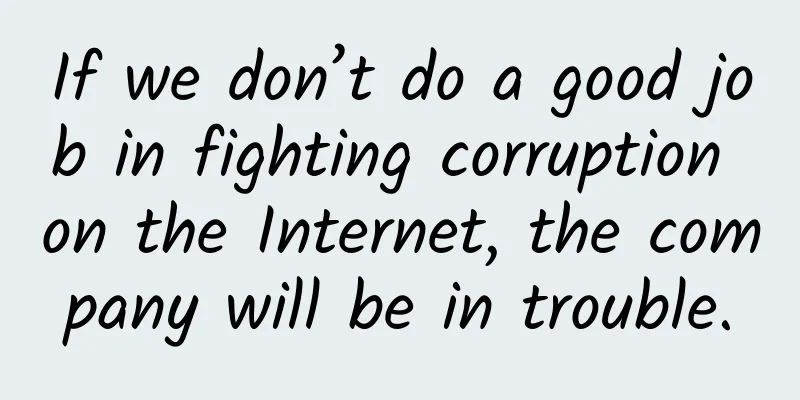If we don’t do a good job in fighting corruption on the Internet, the company will be in trouble.

|
“Where there is a world of martial arts, there is power struggle; where there is money, there is corruption”, but the corruption in the Internet industry in the past two years is still shocking. This shock comes not only from the increasing number of corruption cases in the Internet industry, but also from the position of the bribe-takers in the company, which is "second to none". For example, Kuaishou recently announced that Zhao Danyang, former vice president of Kuaishou and head of the Community Content Research Institute, was arrested for accepting bribes. Considering that Internet companies and physical enterprises have completely different operating models, the increasingly serious corruption problem in the Internet industry seems to indicate that players in the entire industry are facing a "big test." Why does corruption target Internet companies? Although the frequent occurrence of Internet corruption cases can be explained from the perspective of human nature, this cannot provide constructive guidance for the anti-corruption work in the Internet industry. Therefore, we still need to start with the basic characteristics of the Internet industry and consider the root causes of corruption cases in the Internet industry. In his book "Stubborn Disease: Corruption and Anti-Corruption in Chinese History", historian Zhang Hongjie, through analyzing the corruption problem under China's feudal system, expounded the view that an important reason for the frequent corruption cases in the Ming and Qing dynasties (except during the reign of Emperor Yongzheng) was the low income of officials. This logic can actually be applied to the Internet industry. 36kr once asked a post-90s employee who was doing ground promotion at an O2O company in 2014 why he embezzled. The employee said that after joining the company, he saw a colleague buy a house after working for only one year, while he only earned a few thousand yuan a month. He had almost no psychological struggle and chose to embezzle. What is even more intriguing is that the employee also said: "The company raises hundreds of millions of dollars a year and spends tens of millions a day in subsidies. So much money is spent and never seen again. The tens of thousands of dollars I got extra is just a drop in the bucket." From this perspective, the huge gap between the capital boom in the Internet industry and the unsatisfactory salaries of employees may have become an important driving force for corruption among most Internet people. Of course, since workers do not control the means of production, the problem of low wages is actually a common topic in the real industry. The frequent occurrence of corruption cases in the Internet industry may still be attributed to the operating model of Internet companies that mainly exploit information asymmetry and the reality of rapid expansion. From the perspective of enterprises, under the continuous promotion of capital, although Internet companies have repeatedly and quickly created market value myths, there are undercurrents beneath this myth. An industry analyst pointed out that during the Hundred Regiments Campaign in 2014, in order to seize the market, leading companies often needed to expand rapidly. In order to pursue efficiency, most companies chose to "decentralize power", that is, to give the person in charge of field promotion extremely high authority. This made it easy for the nine employees mentioned above to engage in corruption during field promotion. It is worth noting that, in sync with the downward trend in authority, the information asymmetry that the Internet features has also, to some extent, magnified the benefits of corruption. As we all know, Taobao Juhuasuan has always been recognized as the "golden" entrance in the industry. In 2012, this entrance also had corruption problems. Public information shows that Yan Min, the general manager of Juhuasuan, who controls the display rights of the Juhuasuan platform, "made a fortune out of nothing" and used the display rights of Juhuasuan as trading capital to accept bribes of 538,000 yuan. In the end, Yan Min was sentenced to 7 years in prison and was dismissed by Alibaba in March 2012. In a context where power and benefits are magnified and one's own fixed income is not ideal, getting some Internet people to abide by moral bottom lines is as difficult as a thirsty horse guarding water or a hungry donkey guarding food. For Internet companies, corruption can be fatal The reason why the issue of corruption in the Internet industry has always attracted attention is not only because of the excessive incentives mentioned above, but more importantly, it is also closely related to the fact that corruption can have a fatal impact on Internet companies. First, similar to the Taobao Juhuasuan corruption model mentioned above, once employees gain control, it is very likely that the Internet companies will be doomed. Some media have reported that in 2017, in order to quickly capture the market, ofo chose mechanical locks. Precisely because there was no GPS positioning, many grassroots employees sold the ofo yellow bikes, which cost five or six hundred yuan each, to the supply chain at a discount of one or two hundred yuan, and then asked the supply chain to sell the bikes to ofo at the original price. It was not until early 2019 that ofo reacted and announced a major anti-corruption campaign. However, after several months, ofo only recovered a loss of one million yuan, far from making up for the tens of billions of yuan in deposits. In this regard, some industry analysts pointed out that if ofo had vigorously fought corruption at the beginning of its establishment, it might not have ended up in such a dismal way - at the very least, it could have returned the deposit and exited in a decent manner. On the other hand, since many companies make money by taking advantage of information asymmetry, if their own employees are bribed by competitors, the company's information asymmetry foundation will be shaken. In 2018, after Renrenche received $400 million in financing from Didi and Tencent, it began to invest hundreds of millions of yuan in advertising, which also enabled Renrenche to obtain information on tens of millions of vehicles. But then, Renrenche discovered that the car source information that it had worked so hard to obtain was almost at the same time obtained by its competitors. In early 2019, after several rounds of investigation, Renrenche discovered that it all originated from an employee who secretly sold the platform's car source information to competitors. But when Renrenche discovered this problem, it was too late - in February 2019, Renrenche announced its "dissolution on the spot." Anti-corruption in enterprises is urgent Whether it is Internet company executives or ordinary Internet users, they all hate corruption, but as mentioned above, corruption is largely rooted in human nature. Meituan’s anti-corruption director Eric once said that generally speaking, only 10% of a company’s employees will firmly safeguard the interests of the company, 5% of them will become “worms”, and the other 85% will be influenced by their colleagues and the company’s environment. Therefore, after Internet companies realize the causes and dangers of corruption, what they should do most is to "direct the flow of water" and restrain human nature through systems. Taking the above-mentioned "Stubborn Disease" as an example, Zhang Hongjie analyzed the bureaucratic systems in clean regions such as Singapore, Sweden, and Hong Kong, and found that these regions, without exception, have independent and powerful anti-corruption agencies. This is exactly what the Internet companies are focusing on. Zhou Lei, head of Didi’s anti-corruption risk control department, once said that Internet companies previously may not have anti-corruption departments even if they have reached the C round of financing, but recently, most of the start-ups that have only reached the A round of financing have established anti-corruption departments. In addition to the rigid independent anti-corruption agencies, more and more Internet companies have begun to reflect on the loopholes in the system itself. As mentioned above, Yan Min, the general manager of Juhuasuan, was sentenced for "rent-seeking". The reason why the subsequent general manager of Juhuasuan did not follow in Yan Min's footsteps was not only because of Yan Min's previous experience, but more importantly, because Alibaba blocked the space for the general manager of Juhuasuan to "rent-seek". It is understood that after Yan Liming was dismissed, Alibaba changed the process of listing merchants on Juhuasuan, which not only shortened the process but also "reduced the human factors involved" and reduced the influence of senior executives in the review process. In addition, in order to fight corruption more effectively, JD.com, Xiaomi, Meituan and other companies jointly established the "Sunshine Integrity Alliance" in 2017. Once a company finds that its employees are involved in corruption, fraud, leaks and other violations of business principles, the employee's information will be published on the "Sunshine Integrity Alliance" blacklist to remind other members of the alliance not to hire the employee. Official data shows that the "Sunshine Integrity Alliance" has attracted more than 350 Internet companies to join, and there are more than 3,000 people on the blacklist. In this regard, Duan Qiubin, Secretary General of the Sunshine Integrity Alliance and Director of the Internal Control and Compliance Department of JD Group, said: "With the rapid growth of alliance members, the power of this measure will become stronger and stronger. By connecting the untrustworthy list sharing system with the enterprise HR system, the untrustworthy personnel can be automatically identified, which effectively improves the efficiency of enterprises in identifying untrustworthy personnel." Although greed is the root of all evil in the fight against corruption in the Internet industry, from another perspective, it is human desire that drives socialized production. Therefore, in addition to "beating tigers", the fight against corruption in the Internet industry should also create a more sound supervision system and operation model based on the enthusiasm of employees. The frequent occurrence of Internet corruption cases in the past two years shows, on the one hand, that there is indeed room for rent-seeking in most Internet companies, and on the other hand, that Internet companies are making a strong fight against corruption. As Internet companies' governance capabilities gradually mature and competition becomes more ideal, it is believed that in the near future, Internet employees will also "dare not, cannot, and do not want to be corrupt." As a winner of Toutiao's Qingyun Plan and Baijiahao's Bai+ Plan, the 2019 Baidu Digital Author of the Year, the Baijiahao's Most Popular Author in the Technology Field, the 2019 Sogou Technology and Culture Author, and the 2021 Baijiahao Quarterly Influential Creator, he has won many awards, including the 2013 Sohu Best Industry Media Person, the 2015 China New Media Entrepreneurship Competition Beijing Third Place, the 2015 Guangmang Experience Award, the 2015 China New Media Entrepreneurship Competition Finals Third Place, and the 2018 Baidu Dynamic Annual Powerful Celebrity. |
<<: Nissan launches Nismo Watch concept smartwatch: can monitor fuel consumption speed
Recommend
With a sales growth rate that surpasses Audi and Mercedes-Benz, can they really lead BBA in the country in 2017?
Looking at the luxury car market, we have to look...
The underlying rules of private domain traffic growth in educational institutions
If we were to talk about the most popular operati...
Didi Kuaidi was summoned for a talk: Taxi industry reform is going in reverse
The policy relaxation in the private car sector t...
Golden Retriever brought back a "silly roe deer" from the mountains. Are roe deer really stupid?
Science Fiction Network, December 2 (Jin Kaiyi) W...
Top 10 Weird Psychological Characteristics of Social Networking Site Users
With the popularity of social networking sites, m...
If one person is infected, the whole family needs to be treated! Zhang Wenhong: If we eat like this at home, we will see germs everywhere!
If one person is infected, the whole family must ...
What is the most effective way to attract new customers? Take a look at these classic cases!
What is user operation ? User operation is a way ...
How a programmer can increase his net worth 100 times in ten years
[[150355]] About ten years ago, three grassroots ...
Latest! China map, this is the standard one!
Recently, the Ministry of Natural Resources issue...
How to design an App login module
I have previously explained and discussed with yo...
Can fish oil lower blood lipids? Many people may be eating it wrong...
gossip “Can taking fish oil lower blood lipids?” ...
Not the Onion, but bumblebees are really becoming a fish in California!
Starting from May 31 this year, four species of b...
Subaru, known as the next Suzuki, released its first pure electric car, which will be launched next year
Japanese automobile brand Subaru today unveiled t...
Electric Technology Car News: WEY VV7c is known as China's Porsche moving towards high-end. Has Great Wall thought about Zotye's feelings?
Since Great Wall Motors announced the launch of i...









